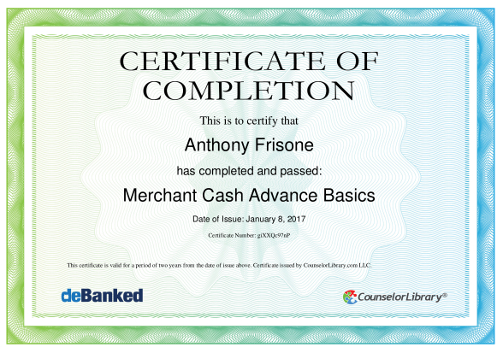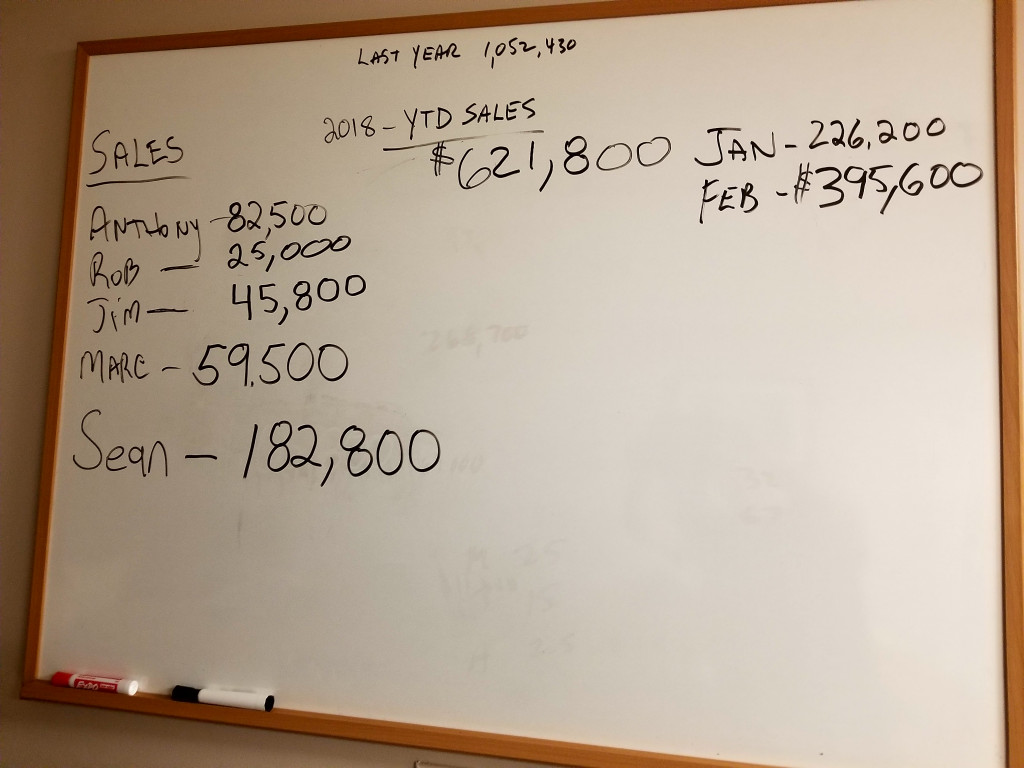Thinking Capital Acquired by Canadian Finance Firm Purpose Financial
March 12, 2018
Thinking Capital, a leader in the fintech lending industry in Canada, was acquired last week by Canadian finance company, Purpose Financial, based in Toronto.
“Under the Purpose Financial umbrella, our time to market on product innovation and funding capacity will be greatly amplified,” said Jeff Mitelman, CEO and co-founder of Thinking Capital.
Mitelman, who co-founded Thinking Capital in 2006, has long been an advocate for improving the way small business credit is evaluated and communicated in Canada.
“The challenge in Canada is that our lending institutions historically either don’t lend to small business or don’t lend to enough of our small businesses,” Mitelman told deBanked. “And that’s driven by the fact that so many of the measures of small business credit worthiness simply don’t exist. Our credit bureaus don’t report on it, there aren’t metrics or scores unique to small business, and most significantly, small business credit has never been attached to retail or institutional conduits for funding.”
 This is where Purpose Financial comes in. Mitelman believes that Purpose Financial’s investment arm and its relationship with Omers, a large Canadian pension fund, will provide small businesses with “access to conduits that historically small businesses have never been able to access.”
This is where Purpose Financial comes in. Mitelman believes that Purpose Financial’s investment arm and its relationship with Omers, a large Canadian pension fund, will provide small businesses with “access to conduits that historically small businesses have never been able to access.”
Thinking Capital provides an MCA product, which it calls Flexible, as well as a term product, which it calls Fixed. It also helps power loans provided by large companies like Staples.
Purpose Financial has three verticals: Investment Management (retail and institutional), Digital Technology, and Capital / Funding.
“Thinking Capital is a clear leader in the small to medium-sized business lending space…” said Som Seif, CEO of Purpose Financial. “[And] this acquisition brings together leading origination, asset management, and technology platforms as a unified entity, and enables us to bolster our product capabilities and optimize the technology, distribution, and funding model of our combined business.”
LendingPoint Debuts Point of Sale Lending Platform for Merchants
March 6, 2018LendingPoint announced today the launch of LendingPoint Merchant Solutions, a platform that allows merchants to offer loans to their customers for purchases ranging from furniture to medical procedures.
“When merchants offer consumer financing at the point of sale, they can remove friction and increase conversion,” said Mark Lorimer, Chief Marketing Officer of LendingPoint. “Our ability to offer shared risk plans, payment servicing plans as well as the full suite of promotional loan products, allows us to service all of a merchant’s customers from 850 all the way down to 500 FICO scores.”
Banks have long provided customers with loans for large priced items, but Lorimer told deBanked that it is very uncommon for non-banks to provide this service, particularly those that carry loans on their own balance sheet.
“The thing that’s different about our program is that in almost every single instance, when you apply for a loan at the point of sale, the first thing that happens is your credit is pulled,” Lorimer said. “This knocks down your credit for a while [and] if you’re in the near prime [FICO score range], 600, 680, you’re usually not going to be approved by a bank.”
Instead of pulling a customer’s credit score, LendingPoint Merchant Solutions does a soft credit pull, which has no impact on a customer’s credit, according to Lorimer.
“Depending on [what] the merchant is interested in, we can get close to 100 percent approval because we can take the loans between 600 and 850 ourselves,” Lorimer said.
LendingPoint offers point of sale loans that range from $500 to $15,000 with terms from 12 to 60 months. And the company responds to customers in a matter of seconds with an approval decision. Merchants get paid in full by LendingPoint Merchant Solutions at the point of sale and the customer does not always pay interest on the loan, as long as they pay within a promotional period set out by the merchant.
In December of last year, LendingPoint acquired LoanHero, which specialized in merchant onboarding, program management and reporting technology. LendingPoint Merchant Solutions combines LoanHero’s know-how with LendingPoint’s credit underwriting, risk management, and customer service expertise. The LoanHero brand has been retired and will now operate as LendingPoint Merchant Solutions.
LendingPoint was founded in 2014 and has issued nearly $500 million in consumer loans to more than 70,000 borrowers.
How One Company is Helping MCA Brokers and Clients Through Credit Repair
March 5, 2018
Venture Credit Solutions, a New Jersey-based credit repair business, was created in 2016 by founder and CEO Joe Clapman. Because of extensive licensing and other legal conditions required to run a credit repair shop, the company didn’t start operating until the beginning of this year, with a soft launch at deBanked’s Miami event in January.
Formerly an MCA broker, Clapman saw firsthand that really bad personal credit could hinder one’s ability to get cash advances for their businesses, along with home mortgages and even jobs. So he started a consumer credit repair business. He is very clear about what he can and cannot do.
“We get erroneous items that do not belong on your credit report, off,” he said.
He cannot recoup people’s money or eliminate credit card debt. He does not guarantee that he will improve your credit score, but he maintains that when negative erroneous data is removed, generally FICO scores go up and people become eligible for more credit or better credit.
This can benefit MCA brokers by allowing them to take unfundable or less fundable MCA clients and turn them into additional clients for credit repair. Clapman said that brokers for credit repair can get a commission similar to a $15,000 to $20,000 MCA deal.
“We don’t have some secret handshake with Equifax and Experian,” Clapman said. “We can’t do anything you can’t do on your own.”
Instead, Clapman told deBanked that Venture Credit Solutions is a service-based company of researchers, who he calls “information givers,” that are trained in determining the accuracy of data on personal credit reports.
“Any data on your credit report has to be accurate to the letter,” he said.
Clapman and his team make money only when they are able to successfully prove inaccurate data and remove it from a customer’s credit report. Every line of a customer’s report is itemized and the customer is told beforehand how much they will pay Venture Credit Solutions if the company is able to prove that the data is inaccurate.
And data is either accurate or it isn’t.
“If someone tells me that something is accurately described on their credit report, it’s actually illegal for me to try and get it removed,” Clapman said.
While Venture Credit Solutions provides services to individual consumers, they do not advertise to the general public. Instead, they get business from brokers, who Clapman calls “referral agents.” These are MCA and real estate brokers, among others, who are trying to improve their client’s credit – if it has been inaccurately reported.
Clapman gave the example of an MCA merchant who signed a document allowing his broker to submit an application to only one funder. But the broker sent the application out to like 93 funders, severely damaging his credit because of all the credit inquiries.
“We can help him to get all these inquiries off,” Clapman said.
One of the core mantras at Venture Credit Solutions is “The client is your client.” This is important to Clapman because he wants to communicate to his referral agents that the company is not trying to steal their clients – by, for instance, finding the client a lower mortgage. Doing something like this would adversely affect the customer’s credit, which is exactly what Venture Credit Solutions is trying to improve.
“We’re trying to create a win-win process,” Clapman said. “The broker is winning because he’s not losing a client, he’s helping a client [and getting a commision.] And the client is winning because his credit is getting better.”
Clapman said that he is in talks with the New York and New Jersey police and fire departments to potentially help their members who might have erroneous data on their credit reports.
Venture Credit Solutions also has a program for startup companies, designed to improve and build the credit of entrepreneurs. The company now has 15 people working at its office in New Jersey and it plans to be onboarding at least an additional 30 within the next two weeks. Some will work remotely, but all will be in the US, Clapman said.
Nest Planner: The Story Of A Startup MCA Broker
March 4, 2018deBanked interviewed Anthony Frisone, the founder of Nest Planner, a young ISO on Long Island, on how he got his start.

What were you doing before becoming an MCA broker?
I was doing real estate and then I got sick. I was having a hard time walking. And you can’t sell real estate when you can’t walk. I was bedridden for a long time [before I got better.] I was in a bad place, mentally and physically, and a friend of mine just said to me “you should try this out.” I knew nothing about it. So I went to his office and I actually grabbed a deBanked magazine off of one of the desks in his office.
What’s the greatest challenge of being an MCA broker?
Being sick was easier than starting out in this business. It was rough. The first three or four months was an uphill battle. It was brutal. We did zero. No business at all. But I didn’t give up. We just kept dialing the phone. I couldn’t even get funders to send deals to. I was calling quite a few of them. And they were like “Who are you sending deals to now?” And I said, “No one. I’m brand new in the business.” And they were basically like “Come back to me when you have something under your belt.”
I had a whole list of people I was calling and I called up a place called Cardinal Equity, which came from the deBanked website or magazine. The owner answered the phone and we were just talking, for a half hour, maybe an hour. I remember it was late at night and right before Thanksgiving, and he said “Call me next week and I’ll send you the application.” I was like “Oh wow, thanks.” [..] Finally he sent it to me and I sent it back to him. And he let me send him deals.
What about getting deals made?
Getting deals was a whole different story because I didn’t have anyone to tell me “Don’t take $5,000 a month accounts.” We were surrounded by no one that knew the business. So it made it even harder by not knowing what I was doing. But I had no choice. So I just came in everyday and worked. And something, little by little, started panning out.
 After Cardinal Equity, I didn’t get another funder until after I took the deBanked “Merchant Cash Advance Basics” [online course] in January 2017. It was eye opening for me. Everything started making sense. I was able to have a conversation with funders and actually understand them. I started sending over my MCA Basics Certificate of Completion to every funder I could think of, and within a month’s time, I had over 30 different funders waiting for me to send them deals. However, [at the time] I had no merchants to send them.
After Cardinal Equity, I didn’t get another funder until after I took the deBanked “Merchant Cash Advance Basics” [online course] in January 2017. It was eye opening for me. Everything started making sense. I was able to have a conversation with funders and actually understand them. I started sending over my MCA Basics Certificate of Completion to every funder I could think of, and within a month’s time, I had over 30 different funders waiting for me to send them deals. However, [at the time] I had no merchants to send them.
So where have you found your best leads?
We tried out so many different places and spent so much money. But we had no one to guide us in the right direction. So we would look online and probably at deBanked also. We called up a bunch of different places. None of them were fantastic, but none of them were terrible. So we knew it was a numbers game and we had to stay on the phone. So there was no set place. I bought a little bit from everywhere and a little bit worked from everywhere.
When did you start making money?
I started the business, called Nest Planner, in October 2016 all by myself. Just me and a desk and a laptop. And I didn’t start making money until March 2017. From October to March was a long 5 months. And in March I made close to $10,000 in advances. But by the end of last year, we hit the $1 million mark in advances. It’s not a lot, but it’s something that showed that we’re doing something right. And this year, it’s just February, and we have over $600,000 in [advances]. That’s huge for us and it’s just from us not giving up and pounding the phones.
How many people work for you?
Six.

How do you personally define success as a broker?
I guess the obvious part is the funds. If you make sales or close deals, it does feel good to make money. I have a wife and two kids and not taking home a paycheck is brutal. But what’s nice, also, is to see the people we hire make money. It’s nice to see them go home with a check.
How many applications do you typically send out?
So far, for January and February of this year, five of us sent in just under a 100 applications. And we funded 20 of them so far.
What resources do you wish you had that could have helped you made more deals in the beginning?
A CRM. I just had paper leads everywhere. We would just write it up on a piece of paper. No CRM and it’s rough. But it costs money. So we weren’t able to do it.
Apart from approving your applications, what do you look for in a funder?
Someone I could trust. Someone that returns calls. At the very beginning, it was hard. couldn’t get the time of day [from funders]. No one would call me back, except for Cardinal Equity. Now they’re actually calling me.
Want to become a better closer in this industry? Join your peers for training and networking at Broker Fair on May 14 in Brooklyn, NY! You can register here.
CIT Group Appoints Factoring Veteran for Southeastern Region
March 2, 2018CIT Group Inc. announced today the appointment of Jerry Younts, a factoring veteran, to its Commercial Services team.
According to Textile World, Younts will serve as Senior Business Development Officer. He will be responsible for offering factoring and asset-based financing services to furniture, textile, and floor covering manufacturers, among others, mostly in the Southeastern United States.
“CIT is continuing to build a best-in-class team to provide factoring and other financing options to Southeastern manufacturers and importers,” said Mike Hudgens, Southeast regional manager for CIT’s Commercial Services group. “We are pleased to welcome Jerry to our lineup of experts.”
The New York City-based public company also has a corporate office in Livingston, NJ and provides an array of financing alternatives including SBA loans and Syndicated loans.
Prior to CIT, Younts worked most recently as Senior Vice president at BB&T Commercial Finance in its factoring group. Before that, he was Senior Vice President at AdvanedAR, a Charlotte, NC-based AR company.
Coral Capital Solutions Expands in the Midwest
February 26, 2018Coral Capital Solutions, which provides AR financing, among other financing solutions to small and mid-sized businesses, announced today that it is expanding its business in the Midwest. In this effort, the New York-based company has hired Bob Hinson as Regional Sales Manager, VP. Hinson will be based in Chicago and will be tasked with building Coral Capital’s relationship with community and regional banks, as well as lenders, workout groups, accountants, attorneys, financial advisors and other referral sources, the company indicated.
“Bob has a long and distinguished career within the factoring community,” said Jim Bertie, Chief Operating Officer of Coral Capital Solutions. “His expansive knowledge and management background will add considerable bench strength to our expanding Midwest client base, helping to educate and support businesses about the tremendous benefits in alternative funding,” he said.
Bertie told deBanked that the company doesn’t have a very large presence in the Midwest and that hiring Hinson is an effort to build business in that part of the country.
Prior to joining Coral Capita Solutions, which was founded in 2008, Hinson held senior level positions at factoring and asset based lending companies. Most recently, he worked as Vice President and Regional Sales Manager at Bay View Funding, a Chicago-based factoring company.
LendingTree 4Q & Full Year 2017 Earnings Released
February 24, 2018LendingTree reported its fourth quarter and full year 2017 results on Thursday. The company’s fourth quarter revenue of $161 million is an increase of 60 percent year-over-year. However, the fourth quarter adjusted net income per share was six cents shy of analysts’ expectations, which caused the company’s stock value to drop by eight percent after the report was released, according to CNBC.
Meanwhile, LendingTree’s GAAP Net Loss from Continuing Operations was $6.5 million. CEO and Chairman Doug Lebda said that this loss reflects a $9.1 million revaluation of the company’s deferred tax assets resulting from recent changes in the tax law that lower its overall tax rate. This, along with a one-time $10 million commitment to establish a charitable foundation.
“Given our recent success,” Lebda said, “we are pleased to be in a position to give back to the community through this foundation, and we look forward to sharing more details with our stakeholders as the foundation develops.”
Revenue for the full year 2017 was $617.7 million, an increase of $233.3 million, or a 61 percent increase over 2016 full year revenue.
“In addition to growing full-year revenue…” Lebda said, “ 2017 was transformational in several ways. We more than tripled our size in the strategically important and highly competitive credit card business [and] our mortgage business grew 25 percent year-over-year in a category where originations were down 17 percent according to industry estimates.”
LendingPoint Co-founder Weighs in on Lending Club’s Earnings Report
February 21, 2018Lending Club announced its fourth quarter and full year 2017 earnings earlier this week. The report included a $92.1 million quarterly loss (which the company attributed primarily to a class action litigation settlement) and a fourth quarter net revenue increase of 20 percent year-over-year.

“This report had lights and shadows,” said Juan Tavares, Co-founder of LendingPoint. “On the regulatory front, [Lending Club] seems to be making a lot of headway,” Tavares told deBanked. “It speaks to the adoption of fintech by regulatory bodies, and really flattens the playing field for the rest of us.”
He also noted that, of course, it’s a positive thing for the alternative lending industry that Lending Club keeps growing. However, Tavares, whose company competes in the same space as Lending Club, sees fundamental flaws in his competitor’s business model.
“In my view, [Lending Club’s] underlying problem is that they don’t have alignment of interest between their stakeholders,” Tavares said. “At LendingPoint, we have a different approach. We look at it really as a balance sheet model, which means that we put everything on our books. We use our own equity. We leverage other investors’ capital, but we’re not an origination platform…Lending Club’s model primarily is that they have to continue feeding the beast, so to speak, in order to continue making their revenues. They don’t have inventory to continue generating assets or to monetize going forward. That’s a significant shortcoming in their model,” he said.
In Lending Club’s press release on Tuesday, CEO Scott Sanborn said, “2017 was a year of rebuilding and transforming our core business. We returned to growth and materially expanded and diversified our investor base. We’re continuing to invest in our people, technology and products to position us for the years ahead.”
Last year, Lending Club started taking on credit responsibility for some of its loans, which may signal a change in direction for the company.
But Tavares said that this still only accounts for less than ten percent of the company’s originations. He’s proud that LendingPoint, founded in 2014, has 100 percent of its loans on its balance sheet.






























